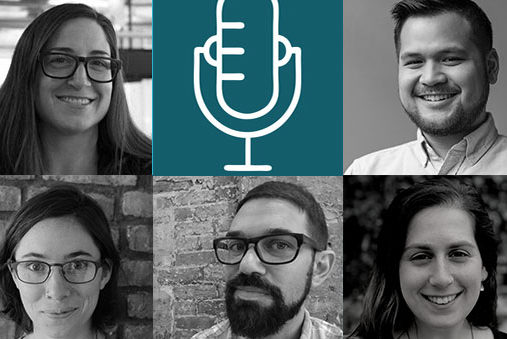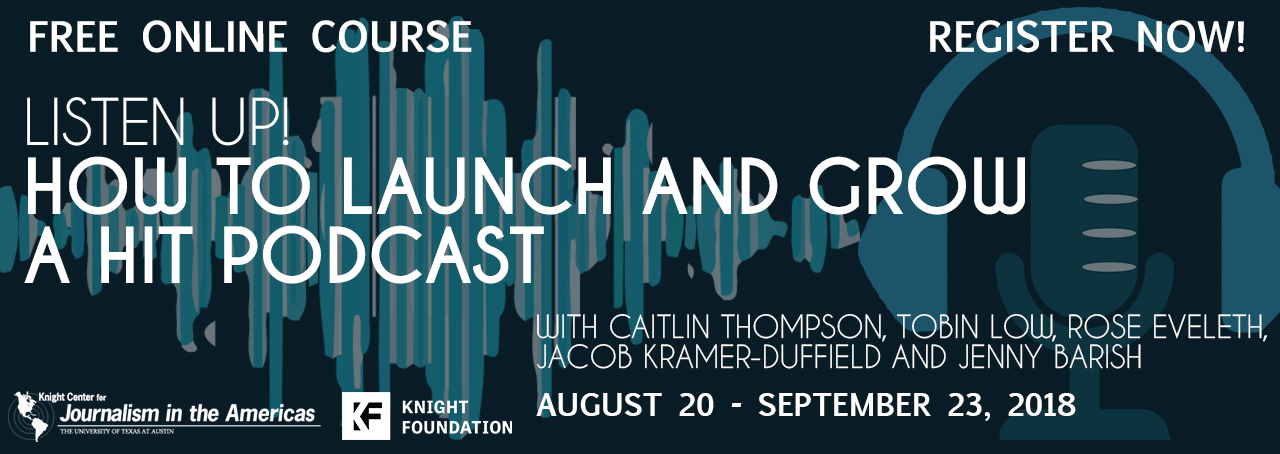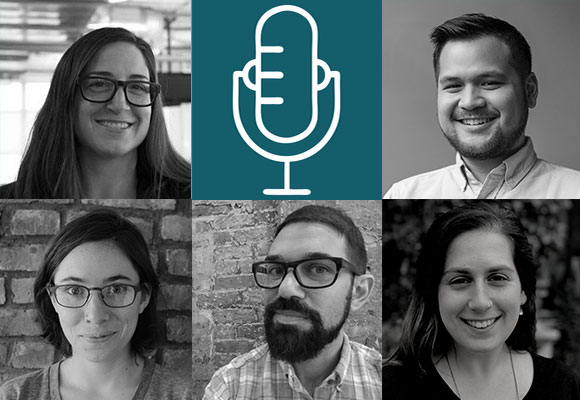Start learning today!
Get early access to learning opportunities from Journalism Courses by the Knight Center.

Through unique personalities and the power of audio, podcasts afford journalists the chance to form close relationships with their audiences, an opportunity no one in media can afford to miss.
Podcast consumption is consistently growing in the U.S. as is the variety of topics of the podcasts available for streaming: news, crime, economics, love, comedy, tech, movies, health and more. The hosts who voice these audio adventures have made their way into our houses, cars and offices as part of consumers’ daily lives.
Now, some of those personalities and the people behind the growth of the industry will join the Knight Center for a free online course, “Listen up! How to launch and grow a hit podcast.” Register now for the Massive Open Online Course (MOOC) that will run from Aug. 20 to Sept. 23, 2018.

Five podcast professionals will show students how to develop an idea, produce and edit a podcast, and grow the project to sustainability.
Instructors are Caitlin Thompson, podcast consultant and co-founder of Racquet magazine; Tobin Low, co-host and co-managing editor of the podcast Nancy; Rose Eveleth, creator and host of the Flash Forward podcast; Jacob Kramer-Duffield, a podcast analytics and audience consultant; and Jennifer Barish, manager of content acquisition at Stitcher Premium.
“Podcasting is supposed to be for everyone—and all podcast enthusiasts are welcome here!” Thompson said. “From students who just want to understand more about this rapidly maturing medium or for people with podcast ideas who’d like to jumpstart the creation of their own podcast by understanding the steps involved. This is an intro-level class, but taught by experts.”
In Module 1, Thompson will introduce you to podcasting with an overview of the field from past to present. Low will cover show development in Module 2, teaching how to develop an idea into a podcast pitch. For Module 3, Eveleth will teach production basics, including recording tools and techniques, edits and processing and getting the product out into the world. Kramer-Duffield will cover podcast analytics and audience engagement in Module 4, looking at baseline numbers and where metrics are headed. And in Module 5, Barish will teach you about different revenue models, including ads, crowdfunding and premium subscriptions.
Instructors will teach the course through videos, presentations, readings and discussion forums.
Here’s a closer look at the instructors and the experience they bring to the course:
“There’s no better time to be launching a course on podcasting. The podcasting field is booming, and it’s transforming the way we tell and share stories,” said Mallary Tenore, assistant director of the Knight Center for Journalism in the Americas. “We’re excited to be launching this podcasting course and couldn’t ask for a better team of instructors. Week by week, they will share their expertise with you, based on their years of experience in the field. By the end of the course, you’ll come away with practical tips and ideas that will deepen your knowledge of podcasting and help you grow and succeed as a podcaster.”
This intro-level class is open to all podcast enthusiasts who either want to learn more about the medium or are looking to start their own projects.
 Instructors, CW from top R: Caitlin Thompson, Tobin Low, Jennifer Barish, Jacob Kramer-Duffield and Rose Eveleth
Instructors, CW from top R: Caitlin Thompson, Tobin Low, Jennifer Barish, Jacob Kramer-Duffield and Rose EvelethStudents will need a computer with an internet browser and will need to download a free audio editing tool. Ideally, they will also have a smartphone with audio recording app. (Instructors will recommend some tools and apps in the course.)
Like all Knight Center courses, the MOOC is asynchronous, meaning you can complete the activities during the days and times that are most convenient for you. However, there are recommended deadlines for each module so students don’t fall behind.
As with all Knight Center MOOCs, participation is free. However, students can pay an administrative fee of U.S. $30 for a certificate of completion. The certificate is available for download in PDF format after the Knight Center completes a review process to ensure the student met the requirements. No formal college credit is associated with this certificate.
About the John S. and James L. Knight Foundation
![]() The Knight Foundation is a national foundation with strong local roots that invests in journalism, the arts, and in the success of cities where brothers John S. and James L. Knight once published newspapers. Its goal is to foster informed and engaged communities, which it believes are essential for a healthy democracy. For more, visit kf.org.
The Knight Foundation is a national foundation with strong local roots that invests in journalism, the arts, and in the success of cities where brothers John S. and James L. Knight once published newspapers. Its goal is to foster informed and engaged communities, which it believes are essential for a healthy democracy. For more, visit kf.org.
About the Knight Center
The Knight Center for Journalism in the Americas was created in 2002 by Professor Rosental Alves, Knight Chair of Journalism at the Moody School of Communication at the University of Texas, thanks to the generous donations of the John S. and James L. Knight Foundation. The Knight Center’s distance learning program began in 2003 and is funded in part by the Knight Foundation. Over the past five years, Knight Center MOOCs have reached more than 150,000 people in more than 175 countries.
Get early access to learning opportunities from Journalism Courses by the Knight Center.